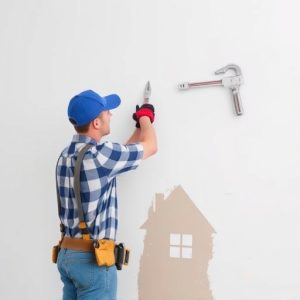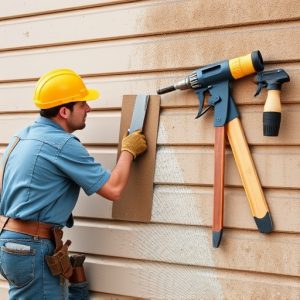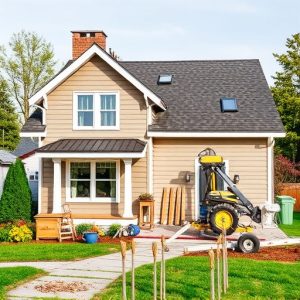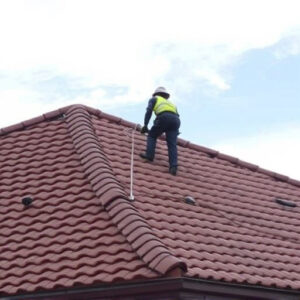Proactive Plumbing Maintenance: A Homeowner’s Guide with Handyman Tips for Sustainable Home Functionality
Regular maintenance is key to keeping your home's plumbing system functioning well and lasting…….

Regular maintenance is key to keeping your home's plumbing system functioning well and lasting longer. Homeowners should routinely check for leaks in faucets, showerheads, and toilets, addressing them promptly with sealants or tightened connections to prevent water waste and potential damage. Proactive steps include yearly drain and sewer line cleaning to prevent clogs, which can be facilitated by monthly baking soda and vinegar treatments in drains. For sewer lines, a plumber's snake or camera inspection can identify blockages effectively. Monitoring sink areas for moisture or signs of pipe corrosion can lead to early detection and resolution of pipe issues, thereby preventing more severe complications. During cold weather, protecting exposed pipes with insulation can prevent freezing and bursts. By following handyman tips for regular upkeep and prompt fixes, homeowners can significantly reduce the need for major plumbing repairs and avoid the associated inconvenience and expense.
For common issues like leaky faucets or clogged sinks, utilizing simple handyman advice is effective, and these tasks often require only basic tools. However, when dealing with complex problems involving main water lines or sewer systems—particularly in older homes or those with unique layouts—professional plumbers are essential due to their specialized knowledge and equipment, ensuring compliance with building codes and legal requirements, and mitigating health risks from improper repairs. Professional intervention is crucial for complex issues to ensure a safe and effective solution.
Ensuring your home’s plumbing system operates smoothly is paramount for a safe and functional living space. This article serves as a comprehensive guide, equipping you with handyman tips tailored for effective plumbing maintenance, thus safeguarding long-term functionality. Navigate through the nuances of common issues that homeowners face and learn simple do-it-yourself fixes. Additionally, discern when it’s time to call in a professional to handle more complex repairs, preserving both your home’s integrity and your peace of mind. With these insights, you’ll maintain a well-maintained plumbing system that contributes to the overall health of your household.
- The Homeowner's Guide to Effective Plumbing Maintenance: Handyman Tips for Long-Term Functionality
- Common Plumbing Issues and DIY Fixes for Every Homeowner
- When to Call a Professional: Understanding the Limits of Your DIY Skills in Plumbing Repairs
The Homeowner's Guide to Effective Plumbing Maintenance: Handyman Tips for Long-Term Functionality

Regular plumbing maintenance is a critical aspect of homeownership that can prevent minor issues from escalating into major, costly repairs. To maintain the functionality and longevity of your home’s plumbing system, it’s essential to adopt a proactive approach. Start by inspecting all faucets, showerheads, and toilets for leaks regularly. Drips may seem trivial, but they can lead to significant water waste over time. If you notice any leaks, address them promptly with sealants or by tightening connections. Handyman tips suggest that shutting off the water supply to the affected fixture before making repairs can prevent flooding and additional damage.
In addition to detecting leaks early on, clear drains and sewer lines annually to prevent clogs. Pouring baking soda and vinegar down drains monthly can keep them clean and free of debris. For sewer lines, a handyman might recommend using a plumber’s snake or a drain camera to inspect for blockages. Regularly checking under sinks for moisture or signs of corrosion can help you identify potential problems with pipes before they worsen. Insulating exposed pipes, especially in unheated areas, can protect them from freezing during cold weather, thus preventing bursts. By following these handyman tips, you can ensure that your plumbing system remains efficient and functional for the long term, saving you time, money, and inconvenience in the future.
Common Plumbing Issues and DIY Fixes for Every Homeowner

When it comes to common plumbing issues that homeowners face, a proactive approach to maintenance can prevent many problems before they escalate. Regular checks and minor fixes by a handyman can save time and money in the long run. One prevalent issue is clogged drains, often caused by accumulated hair, soap residue, or foreign objects. To address this, homeowners should use drain covers to catch debris and regularly clean drains with a mixture of baking soda and vinegar. This simple solution can break down clogs without the need for harsh chemicals. Another frequent problem is leaking faucets, which not only waste water but also increase utility bills. A handyman tip for this is to replace worn-out washers or O-rings, which are typically the culprits behind these drips. For more complex issues like running toilets, a handyman can inspect the flapper valve and flush valve to ensure they are functioning correctly. Simple tools like pliers, wrenches, and an auger are often all that’s needed for these DIY fixes, making plumbing maintenance accessible for most homeowners. By staying vigilant and addressing minor issues promptly, homeowners can maintain a functional home plumbing system and avoid the costly and time-consuming consequences of neglect.
When to Call a Professional: Understanding the Limits of Your DIY Skills in Plumbing Repairs

When minor plumbing issues arise, such as a leaky faucet or a clogged sink, a homeowner with basic handyman skills can effectively address them. Simple tools and straightforward techniques can often resolve these common problems without the need for professional intervention. However, recognizing the limits of your DIY capabilities is crucial to prevent more significant issues down the line. As you delve into more complex repairs, such as those involving the main water line or sewer system, the stakes increase, and the potential for error grows. These systems are intricate and can be hazardous, especially when dealing with older pipes or properties with unique plumbing configurations. It’s not just about the risk of causing further damage; there are also legal considerations and building codes that a professional plumber is trained to understand and adhere to. When in doubt, it’s best to err on the side of caution and call in a certified professional. Their expertise ensures that the job is done right, minimizing the risk of future leaks, water damage, or health issues associated with improperly repaired plumbing systems. Handyman tips are valuable for minor fixes, but when it comes to complex plumbing issues, a professional’s knowledge and tools can make all the difference.
Regular plumbing maintenance is pivotal for any homeowner seeking long-term functionality and safety within their dwelling. The Homeowner’s Guide to Effective Plumbing Maintenance has equipped readers with handyman tips that span from unclogging drains to checking for leaks, ensuring that minor issues don’t escalate into significant problems. Common plumbing woes, such as running toilets and dripping faucets, have been addressed with practical DIY fixes, empowering homeowners to handle these tasks confidently. However, it is equally important to recognize the boundaries of one’s expertise; knowing when to call a professional is crucial to address complex issues that go beyond basic repairs. By staying vigilant and proactive in plumbing care, homeowners can maintain a well-functioning home, minimizing costly damages and enhancing overall living comfort.







